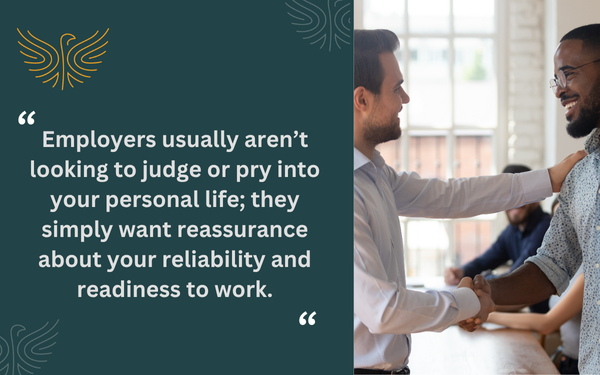Many people in recovery worry about how to explain time away from work during rehab - will employers judge you? Will they immediately reject your application? Will they see you as unreliable or risky?
Ultimately, the goal isn’t to hide your past or create elaborate cover stories. Instead, it’s about presenting your journey professionally and confidently, showing how your experiences have made you a stronger, more dedicated employee.
You’ve done the hard work of recovery—now it’s about framing that work in a way that resonates with potential employers. So, here’s how to navigate conversations about employment gaps with honesty and composure—while also showing the progress you’ve made!
_______________________________________________________
Why Do Employers Ask About Gaps?
Employers usually aren’t looking to judge or pry into your personal life; they simply want reassurance about your reliability and readiness to work. When they see a gap, they’re not thinking about your personal struggles; they’re thinking about their business needs.

What employers really want to know is straightforward: Are you dependable now? Have you addressed whatever caused the absence? Can you perform well in the role they’re trying to fill?
They’re looking for signs of stability, commitment, and capability—all things you can demonstrate regardless of your past.
Once you understand that their questions come from practical concerns rather than personal judgment, you can respond with confidence rather than fear. You’re not defending yourself; you’re simply providing the reassurance they need to move forward. So, here’s how you can do that!
Step 1: Reflect on Your Recovery Journey
Before you can explain your journey to others, you need to understand it for yourself. Take time to identify what you’ve learned and how you’ve changed.
This reflection allows you to speak from a place of growth rather than guilt. Instead of seeing rehab as lost time, recognize it as a period of intensive personal development.
Step 2: Keep Explanations Brief and Professional
You don’t have to share personal details about your recovery journey. Your medical history—including addiction and treatment—is private. If asked about a gap in your work history, you can give a brief, professional answer without oversharing.
For example, instead of saying, “I was in rehab,” you could say:
- “I took some time off to focus on my health and personal growth.”
- “I addressed a health matter that’s now successfully resolved.”
- “I focused on personal development and am now ready to contribute fully again.”
These statements are honest, professional, and all an employer needs to know.
When discussing this period, keep your tone calm and confident—not defensive. Then shift the conversation toward your skills and goals. For instance:
“During that time, I focused on improving my health and building a strong personal foundation. I’m now in a stable, healthy place and fully committed to my professional goals. I’m excited to bring my skills and renewed focus to this position.”
The key is to acknowledge the gap briefly, then steer the conversation toward what really matters—your qualifications, motivation, and readiness to succeed.
Step 3: Use Your Resume to Minimize Gaps
Your resume structure can help minimize the visual impact of employment gaps. Consider using a functional resume format that emphasizes skills and achievements rather than chronological work history. This approach highlights what you can do rather than when you did it.
You can also combine dates to show continuous growth. For example: “2019–2022: Personal and Professional Development, including volunteer work at local food bank, completed online certification in project management, participated in community leadership program.” This shows you were actively engaged in meaningful activities during your recovery.
Include any volunteer work, freelance projects, online courses, or training you completed during recovery. These activities demonstrate continued growth and engagement.
Step 4: Rehearse How to Talk About It
Practice your explanation until it feels natural and comfortable. Say it out loud to yourself, to a mirror, to a trusted friend. The goal is to deliver your explanation calmly and confidently without stumbling or becoming emotional. Avoid the temptation to overshare or provide lengthy explanations that weren't requested.
Step 5: Highlight Your Personal Growth and Readiness
Employers often appreciate candidates who’ve overcome adversity; it demonstrates determination, resilience, and the ability to handle challenges. So, don’t hide from your growth story; lean into the positive qualities that recovery has reinforced, such as accountability and discipline.
If relevant, share how you’ve maintained structure since completing treatment. Maybe you attend regular meetings, volunteer in your community, or have taken on increasing responsibilities in other areas of life. These examples show sustained commitment to growth.
For example: “That experience helped me build a strong sense of structure and self-discipline that I now apply to everything I do. I’ve maintained a consistent routine that includes volunteer work and professional development, which has prepared me well for returning to full-time employment.”
Step 6: Know Your Rights and Boundaries
In the United States, you are not legally required to disclose your rehab or addiction history to potential employers. The Americans with Disabilities Act (ADA) protects individuals in recovery from discrimination. You have the right to keep your medical history private while focusing on your skills and qualifications for the position.
Step 7: Practice Self-Compassion and Perspective
Everyone has chapters in their life that shaped them—yours happened to involve recovery, and it made you stronger.
Remember that many successful professionals have overcome similar challenges. You’re not alone in having a non-traditional path. Some of the most dedicated, reliable employees are those who've worked hard for their second chance and deeply appreciate the opportunity to prove themselves.
Your recovery shows strength, not weakness. Own that strength as you move forward in your career journey!
Moving Forward
You’ve already done the hardest work by achieving and maintaining recovery. Explaining it to a potential employer is just one more step in your journey forward. You have valuable skills, renewed focus, and a perspective that can benefit any workplace fortunate enough to hire you.
If you’re struggling with substance use, our team at Freedom Recovery Centers (FRC) is ready to help. Call us at 804-635-3746 to learn more.
.svg)






.svg)

.svg)



.svg)
